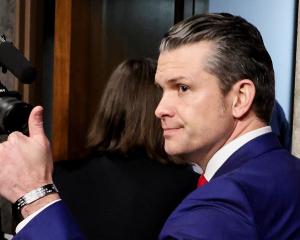
It has been another bad week for the besieged University of Otago, with startling news on Wednesday afternoon that vice-chancellor Prof David Murdoch had resigned from the university’s top job.
Prof Murdoch’s reign was a short one — he took up the position in February 2022 but in March this year went on sick leave. The university says he has now made a full recovery and will return to the Christchurch campus as a distinguished professor in his specialist field of infectious diseases.
While his sudden departure from the registry building has stunned many, and is not an ideal look for the institution as it deals with a bewildering financial crisis, it’s not all gloom and doom. The fact Prof Murdoch has fully recovered from an unspecified illness is good news and we are pleased to hear that.
It does, however, throw yet another spanner into the works for the university, which now has the tricky task of replacing him.
Acting vice-chancellor Prof Helen Nicholson — who has had to front-up for the university on its recent difficult and upsetting announcements about finding $60 million in savings to get back into the black — is to stay on in that invidious role until a "global search" unearths the next vice-chancellor.
One has to wonder how she feels about that. Being the harbinger of so much calamity can’t be much fun and is bound to take some kind of personal toll eventually.
"Global" searches are all the rage these days with big recruitment companies, and it is easy to scoff at just how global some of these actually are. However, there is no doubt in this case that international candidates should be, must be, sought and considered for one of the most important jobs in New Zealand.

The next vice-chancellor of the country’s oldest and arguably most prestigious university is really going to have to take both the institution and the government of the day by the scruffs of their necks, to get out of its parlous financial position and come up with a better model of long-term funding respectively.
Somewhere out there is just the kind of person up for this huge challenge — someone perhaps not quite fitting the traditional vice-chancellor or Otago University mould, perhaps with an unusually maverick streak, but combined with fearsome intelligence and razor-sharp thinking, the required love of knowledge and learning, and an ability to cut to the heart of the matter and slice through the layers of management which have accreted around the registry in recent years.
It might also be a good move to make a conscious decision to appoint someone from overseas. The university sector is changing rapidly around the world and there could be real benefits of having that experience brought into an institution which desperately needs direction as it plans a phoenix-like rise.
Aside from the accolades for Prof Murdoch from university chancellor Stephen Higgs, who said he had progressed important initiatives such as the strategic plan and the Compass culture-change project, no other details have been released about his departure or discussions about the situation at this week’s university council meeting.
Mr Higgs would not comment further to protect Prof Murdoch’s right to privacy. Neither would Prof Murdoch talk to the ODT, though in a statement he said his illness had forced a rethink of the future and a "difficult decision to take up new opportunities".
Prof Murdoch has obviously been through a bad time healthwise this year. He is entitled to some privacy at least. But there is a disturbing pattern of silence from the university on this and on other matters arguably of public interest.
It’s an intriguing question, but given the current state into which the university has fallen, should privacy automatically trump public interest when it comes to matters relating to the institution’s leader?












